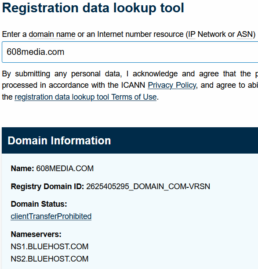If you’re thinking about creating a website, one of the first decisions you’ll need to make is where to host it. There are a few different options, and it can be tough to decide which one is right for you. In this blog post, we’ll discuss where websites are hosted and help you figure out which option is best for your business.
Where are Websites Hosted?



Websites are hosted on servers, which are essentially just powerful computers. A server’s job is to receive requests and send back the information requested by a user. The code that makes up your website exists and is stored on the hosting server.
Where the server is located has no effect on your website, but it can have an impact on things like loading times depending on where most of your users live. The further your users are from your web hosting service, the longer it will take for your website to load.
This is why most hosting providers offer a content delivery network or CDN. A CDN is a network of servers located all over the world that can cache your website and serve it to users wherever they are. A CDN will help reduce your website’s loading time for more distant users.
What is Web Hosting?
Web hosting is the service that puts your website on the internet. Most hosting providers will simply add your website to their web server and the rest is up to you.
You’re given access to a certain amount of disk space and bandwidth depending on your plan. You can use this space to store your website files, images, and videos. The bandwidth controls how much data your website can send and receive.
Depending on your website, you may need more resources. If you run out of space or bandwidth, you’ll need to upgrade your plan. If you don’t and your site goes over the limit, it might go down until the next month when it resets again. Otherwise your web hosting company will likely bill you extra to keep your website live.
Domain Registration vs Website Hosting
Domain registration and website hosting are often confused with each other, but they’re actually two different services. Domain registration is the process of registering a domain name like “example.com” with a domain registrar. The domain registrar then points your domain to the website hosting service. Website hosting, on the other hand, is where your actual website files are stored.
Types of Web Hosting Services
There are number of different hosting options available for your website. The right choice for your website will depend on whether your priority is saving money or having the best website performance. The most common types of hosting include:
Shared Hosting
Shared hosting is the most popular and affordable type of web hosting. Your website shares server resources with other websites on the same server. This is a good choice for small businesses or bloggers who don’t have high traffic levels.
Unfortunately, shared hosting comes with many risks for the affordable price tag. Because the server is shared, your website shares IP address with others. If another site on the server gets blacklisted by search engines or receives a ton of spam, your website will be affected.
Another downside to shared hosting is the security risks. Since your files are stored next to other websites, hackers have an easier time gaining access to them. You’re also sharing the same space and bandwidth with other websites, so your website may slow down or go offline if another site on the server uses up too much of the resources.
Cloud Hosting
Cloud hosting is a newer type of hosting that’s becoming more popular. With cloud hosting, your website is hosted on multiple servers instead of just one. This ensures that your website will stay online if one of the servers fails. It also provides better performance by spreading the load among several servers.
The downside to cloud hosting is that it’s more expensive. You pay for the extra servers and resources you use, so your hosting costs will increase as traffic to your website increases.
Managed Hosting
With managed hosting, a team of professionals will handle all aspects of maintaining and running your website for you. This includes managing updates, security, performance optimization, backups and more.
The added benefit here is the peace of mind from knowing that your website is safe and secure, which is an essential part of what makes a good website. Your hosting provider will take care of everything for you, so if something goes wrong or gets hacked, they’ll fix it for free. This saves you a lot of time and money in the long run.
VPS Hosting
Virtual Private Server or VPS hosting is a step up from shared hosting. With VPS, you get your own private server space that’s not shared with other sites on the server. You’ll still be sharing resources with other websites on the server, but much less than with shared hosting.
Some hosts will offer unmanaged VPS hosting where you’re responsible for setting up and maintaining the server yourself. Others will offer managed VPS hosting where your host handles this for you.
Dedicated Hosting
Dedicated hosting is the ultimate web hosting solution. You’ll get your own dedicated server that’s not shared with other sites on the server. This provides you with complete control over every aspect of your website, but it also comes with a higher price tag and more responsibility.
Most companies don’t need dedicated hosting unless their website receives a high volume of traffic. This type of hosting is more suited for large businesses or eCommerce websites that receive thousands of visitors per day.
Picking the Right Web Host
No matter what type of website you have, your hosting needs will be different depending on the size and traffic levels. The best way to pick a web hosting service is by evaluating providers based on:
Site Load Speed



Site load speed is important for search engine optimization and keeping visitors happy. If your website takes too long to load, you will lose a lot of traffic and potential sales. A good web hosting company should offer solid state drives (SSD) as standard with all hosting plans because these are much faster than traditional hard disk drives (HDD).
Customer Support



A good web hosting service will offer great customer support via phone and email. Some hosts may even provide live chat to help you answer questions about their hosting plans or site migration services.
Keep in mind just because a hosting company offers 24 hour customer service doesn’t mean you’ll always get help in that time frame. You may have to wait on hold for an hour before speaking with someone who can solve your problem
If you are serious about good customer service, check out 608 Media’s managed WordPress hosting plans. Our team offers three plans to fit every small businesses’ web hosting & maintenance needs.
Uptime Guarantee
A web host should offer an uptime guarantee of 99.99% or higher. This means your website will be up and running 99.99% of the time or more. Any downtime below this threshold is unacceptable and you should consider switching hosts.
Many web hosts offer a money-back guarantee if you’re not satisfied with their service. This is a great way to test out a host before making a commitment. Try out their service for a month or two to find out if there is a good fit. There are many web hosts to choose from, so be patient and you will be find one that is a good fit for your business website.
Frequently Asked Questions
Besides the advice offered above, our team frequently receives questions about website hosting such as:
Does Every Website Need a Web Host?
Yes, every website needs a web host to be on the internet. You can build your website in a local environment if you so choose, but it won’t be live on the internet until you setup your hosting.
How Do I Find Out a Website's Hosting Provider?



Every website has a WHOIS record that lists the website owner, web host details, and their contact information. You can also look up this information via a third-party hosting checker tool such as DomainTools or ICANN Lookup.
WHOIS records won’t necessarily tell you the hosting provider, but do typically include the hosting nameservers. These nameservers will often help you figure out the hosting provider. For example, Bluehost’s nameservers include their name in the address.
Are There Free Web Hosting Options?
There are a few free web hosting options, but they typically come with serious limitations. For example, you may only be able to host one website or your website files may be limited in size.
If you’re looking for a free option, we recommend using the Google Cloud Platform which offers free hosting for up to 500MB of storage and traffic.
However, we strongly recommend against free web hosting because it can negatively impact your brand. Many free hosts display advertisements on their customer’s websites that they don’t have control over. On top of this, Google may not rank a site hosted by a free provider as highly as paid plans.
How is WordPress Hosting Different?



WordPress hosting is a specific type of hosting that is designed for WordPress websites. This type of hosting typically includes features like one-click installation, automatic updates, and malware protection.
If you’re using WordPress, we recommend looking for a web host that specializes in WordPress hosting. This will ensure your website runs smoothly and you have access to expert help.
Wrapping Up
So, what have we learned? First and foremost, that website hosting is incredibly important. Your website’s home base needs to be a sturdy one if you want your pages to load quickly and to maximize your website seo. Second, there are many different types of web hosting to choose from- it all depends on the size and purpose of your website. And third, that picking the right host can make all the difference in terms of how successful your website becomes. With these points in mind, we hope you feel better equipped to tackle the daunting task of choosing a web host for your business site. If you are searching for affordable managed WordPress hosting solution, be sure to contact 608 Media! Our team has helped dozens of clients with hosting and maintaining their WordPress websites.
